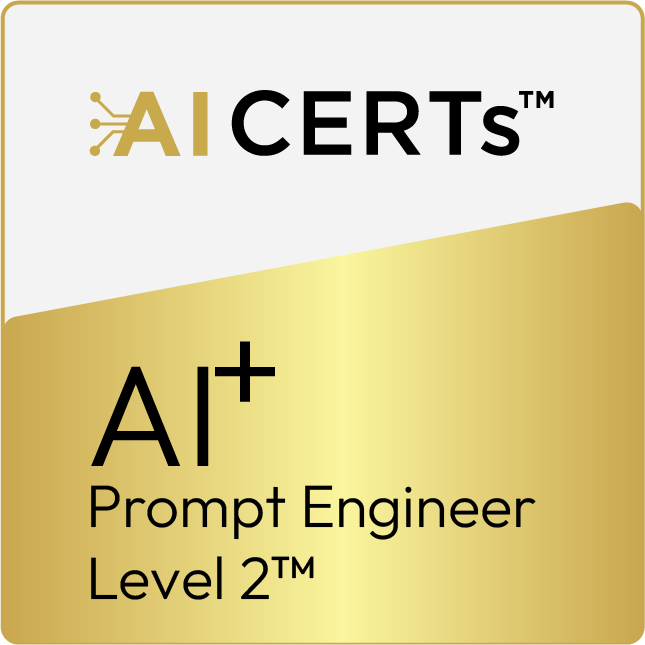AI+ Prompt Engineer Level 2™
AC-1302
Mastering Advanced Techniques for Effective AI Prompting- Prompt Mastery: Learn to design, refine, and optimise prompts across AI applications
- Hands-On Learning: Gain practical experience with advanced tools for prompt integration
- Real-World Focus: Solve real-world challenges using AI-driven prompt solutions
- Advanced Curriculum: Emphasises experimentation, project execution, and innovation
- Leadership-Oriented: Ideal for professionals bridging the gap between AI innovation and application.
Why This Certification Matters
At a Glance: Course + Exam Overview
- Instructor-Led: 5 days (live or virtual)
- Self-Paced: 30 hours of content

Who Should Enroll
AI Developers: Enhance your prompt engineering skills and optimize AI-driven applications for diverse use cases.
Machine Learning Enthusiasts: Learn how to fine-tune models and improve AI performance with advanced prompting techniques.
Tech Professionals: Integrate cutting-edge prompt engineering strategies into your AI solutions for greater impact.
Students & New Graduates: Gain expertise in prompt engineering and boost your career prospects in the fast-growing AI field.
AI Researchers & Practitioners: Deepen your knowledge of AI models and develop advanced prompt engineering techniques for real-world applications.
Industry Growth: Elevating Human-AI Collaboration Across Complex Use Cases
- The prompt engineering market is growing rapidly, with a projected size of $222.1 million in 2023 and a CAGR of 32.8% from 2024 to 2030.” (McKinsey)
- Designing AI-driven prompts to optimize model responses and improve interaction quality across applications.
- Leveraging advanced prompting techniques to fine-tune AI models for enhanced performance and personalized experiences.
- Optimizing AI systems with prompt engineering, improving efficiency in natural language processing and machine learning.
- As demand for prompt engineering grows, high-paying job opportunities are increasing globally for those with AI expertise.

Skills you will gain
- Advanced Prompt Engineering Techniques
- Crafting and Optimizing Prompts
- Integrating Prompts with Development Tools
- Applying Prompts Across Diverse Domains
- Real-World AI Project Experience
- Advanced Strategies in Prompt Engineering
- Experimentation and Optimization of Prompts
- Creating AI-Driven Solutions
What You'll Learn
- 1.1 Overview of Prompt Engineering
- 1.2 Basics of API Interaction
- 1.3 Understanding Prompt Structures
- 1.4 Case Studies and Best Practices
- 1.5 Hands-on Exercise
- 2.1 Designing Advanced Prompt Techniques
- 2.2 Designing Multi-Turn Interactions
- 2.3 Contextual and Conditional Prompting
- 2.4 Crafting Domain-Specific Prompts
- 2.5 Contextual and Stateful Prompt Engineering
- 2.6 Meta-Prompting and Autonomous Refinement
- 2.7 Hands-on Exercise
- 3.1 Automated Prompt Optimization Tools
- 3.2 A/B Testing and Evaluation
- 3.3 Reinforcement Learning for Prompt Engineering
- 4.1 Contextual and Role-Based Prompting
- 4.2 Adaptive and Multimodal Prompting
- 5.1 Integrating with Popular Development Tools for Prompt
Engineering - 5.2 Code Repositories and Templates for Prompt
Engineering - 5.3 Developer Communities and Forums for Prompt
Engineering - 5.4 Version Control in Prompt Engineering Projects
- 6.1 Natural Language Processing (NLP) Applications using
Prompt Engineering - 6.2 Business Applications using Prompt Engineering
- 6.3 Creative Applications using Prompt Engineering
- 7.1 Project 1: AI-Driven Customer Support
- 7.2 Project 2: Personalized Content Generation
- 7.3 Project 3: AI in Data Analysis
Tools You’ll Master

ChatGPT

LangChain

BetterPrompt

GitHub Copilot
Prerequisites
- Familiarity with at least one programming language (Python recommended).
- Basic knowledge of RESTful services and API interactions.
- Basic understanding of AI concepts and language models.
Exam Details
Duration
90 minutes
Passing Score
70%
Format
50 multiple-choice/multiple-response questions
Delivery Method
Online via proctored exam platform (flexible scheduling)
Exam Blueprint
- Introduction to Prompt Engineering - 10%
- Advanced Prompt Design and Engineering - 15%
- Experimentation and Optimization - 15%
- Designing Advanced Strategies for Prompt Engineering - 15%
- Integration with Development Tools - 15%
- Applications of Prompt Engineering in Various Domains - 15%
- Project-Based Learning: Real-World AI Projects - 15%
Choose the Format That Fits Your Schedule
What’s Included (One-Year Subscription + All Updates):
- High-Quality Videos, E-book (PDF & Audio), and Podcasts
- AI Mentor for Personalized Guidance
- Quizzes, Assessments, and Course Resources
- Online Proctored Exam with One Free Retake
- Comprehensive Exam Study Guide
- Hands-on Labs
Instructor-Led (Live Virtual/Classroom)
- 5 days of intensive training with live demos
- Real-time Q&A, peer collaboration, and hands-on labs
- Led by AI Certified Trainers and delivered through Authorized Training Partners
Self-Paced Online
- ~30 hours of on-demand video lessons, e-book, podcasts, and interactive labs
- Learn anywhere, anytime, with modular quizzes to track progress
Discover Your Ideal Role-Based Certifications and Programs!
Not sure which certifications to go for? Take our quick assessment to discover the perfect role-based certifications and programs tailored just for you.
Get CertifiedFrequently Asked Questions
This course dives into advanced prompt engineering techniques for AI models, focusing on optimizing prompts for better AI responses.
AI developers, data scientists, and content creators who have completed basic prompt engineering courses and want to advance their skills.
You’ll explore advanced techniques like few-shot prompting, chain-of-thought prompting, and AI prompt optimization for complex models.
Industries like AI development, content creation, and AI research benefit from better prompt engineering.
You will work on projects that include optimizing AI-generated content and enhancing AI tools for business applications.
